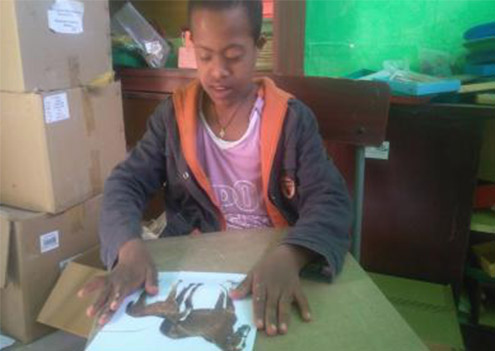Kidanemariam Dagnew
 In developing countries like Ethiopia, it is difficult to get intellectual disability supports and Inclusive Education Recourse Centers (IERC) in primary schools. Due to this challenge, most children with intellectual disabilities live in closed homes without any support and treatment.
In developing countries like Ethiopia, it is difficult to get intellectual disability supports and Inclusive Education Recourse Centers (IERC) in primary schools. Due to this challenge, most children with intellectual disabilities live in closed homes without any support and treatment.
Kidane Mariam was born with an intellectual disability in Urgesa town in Amhara Region) and treated in a clinic. There was improvement when he used his medicine. He needed to go to school and learn along with his peers; however, there was no inclusive school nearby his residence. So, his parents moved to Woldia town, after hearing about Melkakole School providing inclusive education services to children with disabilities. But, the school only provides enrollment opportunities for students with hearing and visual impairments. The school was not enrolling children with intellectual disabilities. The main reason was the absence of the Inclusive Education Resources Center (IERC) and the negative attitude of teachers towards students with intellectual disabilities.
In the new academic year, ECDD has established a teaching unit for children with intellectual disabilities and IERC by fulfilling Montessori kits. Following this, the child enrolled in the school. Presently, the child has been learning daily life skills like dressing, eating, hand washing, identifying things…etc. He has made many improvements academically and socially. His mother said, “Before he joins the school I cannot participate in any social life in the community, I spend my daily life trying to protect him from any dangerous accidents and abuses. He can’t sleep without me. I am afraid, if I die, he will suffer. But now he can sleep without me, he identifies dangerous objects and I can participate in different social activities, he can play with his peers without quarreling. ”
Finally, his mother said, “I have no words of gratitude. This project has supported my son beyond my expectations and provided him the opportunity to be seen equally as his peers.”
